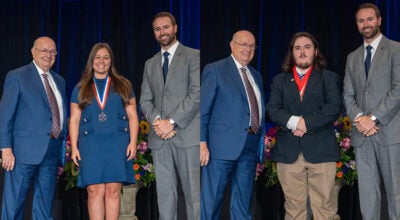Meth, pills, spice big problems here
Published 12:00 am Wednesday, October 22, 2014
Meth, prescription pills and synthetic marijuana are among the county’s largest drug problems, DTF agent Dave Harrell said Tuesday night.
Harrell represented the DTF at a communitywide meeting discussing drug usage in the county.
The event was held at Andalusia High School.
Harrell said the meth problem has plagued the county for a long time, adding that the epidemic came to Covington County around 2000.
During that time, Harrell said, DTF raided on average four meth labs per day.
Harrell discussed some of the ingredients used to manufacture the drug, which include ephedrine, red phosphorus, lithium, antifreeze, lantern fuel and anhydrous nitrate, among other items.
Harrell said for those who develop a meth addiction, only 3 in every 100 people who seek rehabilitation “clean up.”
“When you have someone who is on meth, they are no longer who God designed them to be,” he said. “They become a zombie or a robot. They are not thinking about family, they are just wanting the next fix.”
Additionally, Harrell explained that children who are present in a home for a Red-P cook will test positive for meth.
Harrell discussed the newer one-pot method for the manufacturing of meth.
The process takes approximately 45 minutes as opposed to the traditional red phosphorus lab, which takes three hours.
Harrell said a gram of meth sells for $100.
Harrell recalled a story about a meth user who had beaten his wife in Opp, and had become paranoid and violent.
Harrell said he received a call to the man’s residence stating that man was attempting to burn down his home.
“When I got there, smoke was rolling out the front windows,” he said. “I noticed someone in the backyard.”
Harrell gave background information that said the man had convinced himself that the Opp Police Department had bugged his home. He moved furniture, stopped up drains and the commode, among other things.
Harrell recalled the man was standing in the back yard with only his boxer shorts on, had rubbed smut all over him and had a water hose with a brass nozzle on him and was spraying himself with the water hose.
Harrell said the man had “wild eyes,” and told him he was going to kill him if he came closer.
“If you threaten me, you’re under arrest,” Harrell said. “Then he sprayed me with a water hose.”
Harrell said inside the man’s home, a fight broke out between the two after the man hit him bit the brass nozzle. They both wound up at the hospital.
Before meth, the man was a deacon at a church and had a $60,000 a year job.
“He was a good guy,” Harrell said. “He went to a party one night, and somebody brought out a line. He tried it. Worst thing he every did.”
Harrell said that most every drug users has an associate drug.
Discussing Covington County’s prescription drug problem, Harrell recalled an Opp High School senior who took pills from his father. He in turn distributed them to a classmate.
The classmate became dizzy and began sweating. Harrell said eventually, the classmate vomited and passed out.
He was rushed to the hospital, but had no idea what he had taken.
Harrell was dispatched to the high school to talk to the student who distributed the pills.
“I took him out of the high school in a set of handcuffs in front of all of his friends,” he said. “He was 18 years old and had a felony. He didn’t get to graduate high school. He didn’t get to go to prom. He was in jail.”
The newest threat to the county, Harrell said, is synthetic marijuana.
Known on the street as K2, Spice, G-Force, Dank, Magma, Ninja, Puff, Skink and more, the draw is that it doesn’t show up on drug tests like marijuana does.
Harrell explained that spice doesn’t have the same properties as marijuana, but instead has the same as LSD.
“It’s just as dangerous as anything else in Covington County,” he said. “I haven’t looked at the statistics, but I’d say that 90 percent of drug arrests we make, they also are in possession of synthetic marijuana.”
Harrell said he has not yet met anybody who decided to be a drug addict.
“This is not a war on drugs,” he said. “This is about trying to save lives.”




